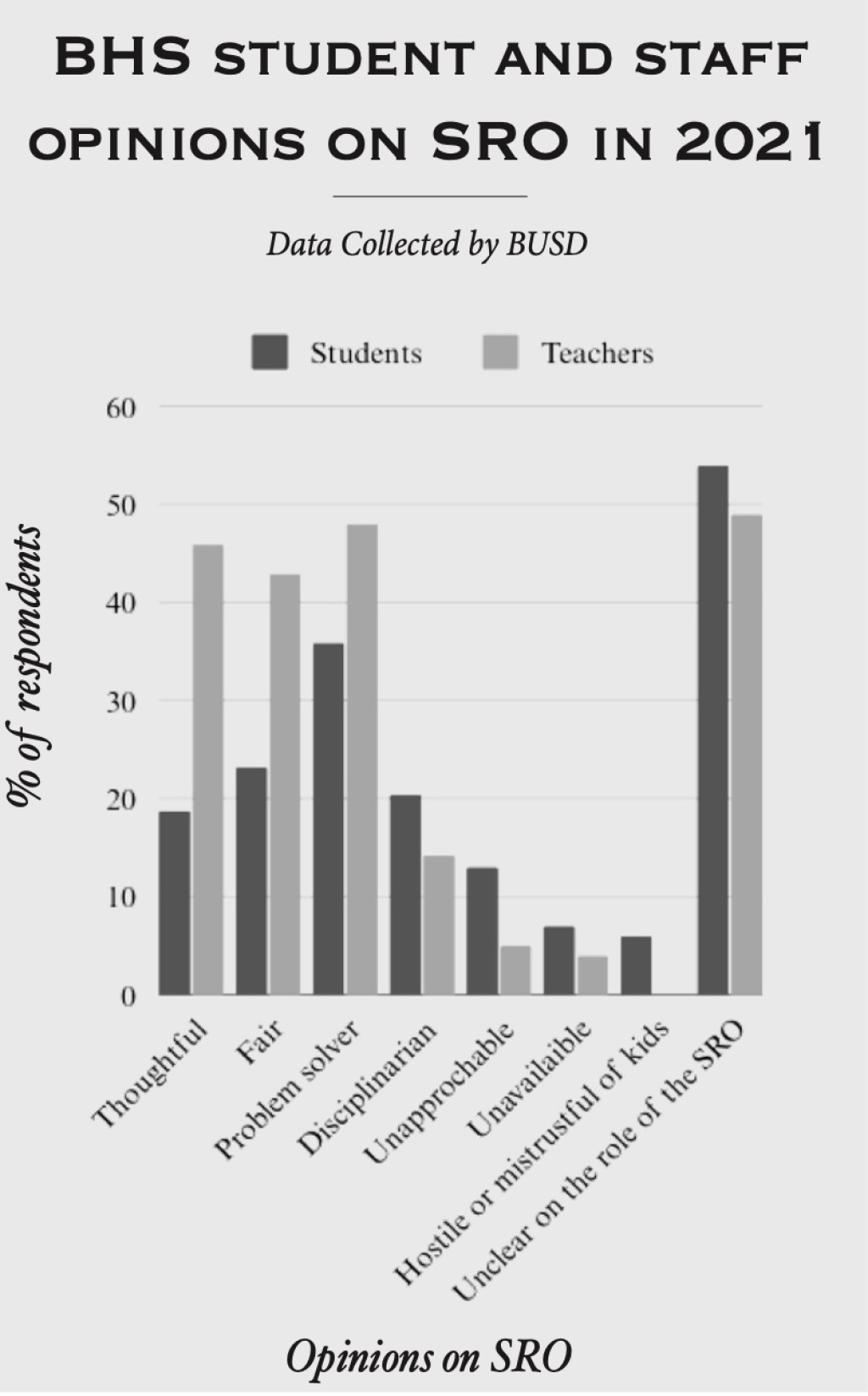This fall, Berkeley High School introduced School Resource Office (SRO) Lino Guananja as a new member of its security team. Officer Guananja has worked for the Berkeley Police Department (BPD) since 2022. The police car students and staff often see parked outside the school, is used by Guananja.
As a member of the BPD, Guananja wears a police uniform and is armed. He has the ability to make arrests, write case reports on illegal activity, and perform any other duties a normal police officer would.
“It’s busy, there’s a lot of activity around, so I’m just making sure I’m able to help make this a safe, fun, and secure learning environment for students,” Guananja said, “Also, I serve to be a liaison between the police department and the high school, and that includes parents, teachers, students, and administration.”
Following the protests after the murder of George Floyd in 2021, the BUSD School Board questioned the need for armed SROs at BHS. A committee of students, administrators, parents, and other community members came together to survey students, staff, and parents and to discuss the issue. Ultimately, the committee concluded that having on-campus officers was beneficial and not only should this system stay in place, but it should be expanded, as it provides a variety of safety benefits. However, due to budget constraints, an expansion is not possible.
“Having an SRO that knows the kids and knows the community and the culture can allow interactions to be less invasive and less intense and hopefully have better outcomes than if it were to be another member of the BPD,” said Gabriel Fredman, a member of the committee. Fredman has worked in the BUSD community for over a decade, including serving as the BHS vice principal for almost a semester. Fredman is now the principal at Thousands Oaks Elementary School. While at BHS, Fredman said, “I did witness numerous occasions where having a familiar police officer significantly kept things much safer than if we had to call 911 for an emergency.”
“It’s good because we’re kind of near downtown, and it’s busy so it can be dangerous,” Eliana Gilbert, a freshman who frequently goes off campus for lunch said, “It’s important to make sure students and staff are safe, and that outside people that shouldn’t be on campus, are not getting in.” Gilbert explained how she feels more comfortable at school knowing that there is someone in place who can intervene if there’s a dangerous situation.
“We want to be there because we want to prevent crimes from happening,” said Mike Parsons, a sergeant and member of the BPD, “We also take criminal reports as things arise on campus. But we also provide counsel and advice to students on an individual basis. We provide physical presence and we also provide deterrence for non-students or people trying to get on campus when they shouldn’t be. Ultimately, we want BHS students to feel safe at school and we believe having an SRO on campus helps us with that goal.”
The presence of SROs in high school settings has become a widely disputed topic across the country, particularly in recent years. Those in favor argue that cops on campus provide a necessary level of security, especially since school gun violence has drastically increased since the early 2000s.
However, some, such as Joni Landeros-Cisneros, a Ph.D. student in Critical Studies of Race, Class, and Gender at UC Berkeley, hold a more critical view of the presence of police officers on campus. “It’s been shown that (having SROs on campus) negatively affects students from historically marginalized communities such as students of color, first generation students, immigrants, non-English as their first language students, and even students with who are neurodivergent or with disabilities,” Landeros-Cisneros said, “Many SROs discriminate through bias, like the trainings that these police officers receive are not critical race theory so they argue in principles of objectivity, race neutrality, when in reality, the practices show there’s blatant discrimination, whether that’s anti-blackness, misogyny, or xenophobia.”
Landeros-Cisneros favors a different solution to addressing safety concerns. “I know in Oakland, they don’t have school officers. They have more-so mentors or people from the community, whether it’d be coaches, or counselors. Those people go and do the appropriate training to maintain the state’s requirement to have some sort of safety protocol for the school,” Landeros-Cisneros said.
“It makes me feel weird knowing that there is always an armed officer the whole time at school,” Carlos Johns, a freshman who expressed discomfort with SROs on campus, said, “Especially, since the officer is from the police, I just feel like that’s taking school security a little too far.”

As BHS students adjust to Guananja’s presence on campus, discussions about the role of campus officers continue. For many students, Guananja represents a safety net during school hours, while others remain uncertain of the effects his presence may hold for the overall school environment.
In the meantime, Guananja continues to patrol the campus daily, visible to students and staff throughout the day. His presence represents an ongoing effort by the school to adapt to modern safety needs while fostering a positive educational space for BHS’s student body. “Anybody who has any curiosity about policing, about working in the public sector, not police related, … anything like that, I want the students to be able to know that they can come to me with that and I would love to talk with them and get to know them,” Guananja said, “I’m here as a resource for not only the safety of the school, but to also be a friend and a teacher figure to the whole Berkeley High (School) community.”





